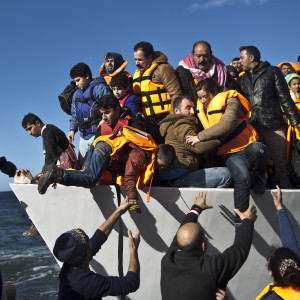When the Nazis came to power in 1933, they vowed to get rid of all the Jews in the Reich. Their plan was not mass murder — not yet — but mass deportation.
Different places to dump the Jews were debated — Madagascar, Palestine — but none panned out. After Austria was annexed in 1938, those Jews, too, had to be “cleansed” from the Reich; one of the first things done after Austria was merged with Germany was to set up an office for Jewish emigration. Even after Kristallnacht, in November 1938, the official Nazi policy was forced deportation, and every Jew knew that their only hope to stay alive was to get out.
So, why didn’t every Jew leave?
They didn’t leave because the places that would have offered them safe haven — mostly the United States and the United Kingdom — did not want them. The number of refugees the United States was willing to take in was tiny, because public opinion was clearly against the idea.
As a Washington Post article made clear (“What Americans Thought of Jewish Refugees on the Eve of World War II,” Nov. 17), less than 5 percent of Americans had a favorable opinion of taking in European refugees in July 1938. When, after the horrors of Kristallnacht, the U.S. government surveyed opinion on whether or not to bring in 10,000 Jewish children, 61 percent of the country opposed the idea.
The reason was pretty simple: anti-Semitism, fear of the Other, not wanting to be responsible for strangers. Of course, that is not what they said. What they said was that Jews were Germans — and how could we really be sure they were on our side? Jews were different.
Since 9/11, the United States has taken in 750,000 refugees. Not one of them has been involved in a terrorist act. Most refugees spend well over a year in transit and refugee camps, where they are thoroughly screened. The screening system for them is far more rigorous and intensive than for almost any other group of people we let into this country.
So when American governors, representatives and senators say that we cannot take in Syrian refugees because they are a threat to our security — not even, as Gov. Chris Christie, R-N.J., said, “a 3-year-old orphan” — they don’t honestly believe it. No one who looked at the facts of the refugee process would. They were waiting for a reason to pander to the fear, ignorance, hatred and small-mindedness of large sections of the American public. They were waiting to score political points at the cost of innocent, desperate lives.
If you are still on the fence about the refugee issue, take a moment out to do this little experiment. Take the face of someone you love — a small child you care for and protect, your partner, your sister, your best friend, your grandfather. Superimpose it, in your mind, on one of the many photographs of Syrian refugees that are available on the Internet. What would that person you love look like as they stared at the camera from within a displaced persons camp, or as they got out of a rickety boat bringing them to safety? Would they look exhausted? Despairing? Frightened? Ask yourself if you would want someone to give them a second chance.
Turning away refugees is inhumane. We are a better country than that.

